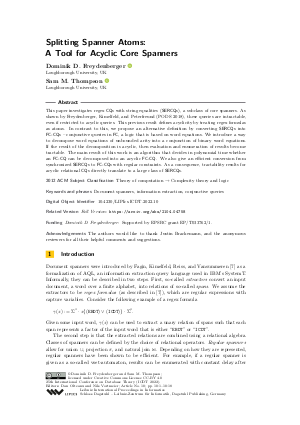Splitting Spanner Atoms: A Tool for Acyclic Core Spanners
Authors
Dominik D. Freydenberger  ,
Sam M. Thompson
,
Sam M. Thompson 
-
Part of:
Volume:
25th International Conference on Database Theory (ICDT 2022)
Part of: Series: Leibniz International Proceedings in Informatics (LIPIcs)
Part of: Conference: International Conference on Database Theory (ICDT) - License:
 Creative Commons Attribution 4.0 International license
Creative Commons Attribution 4.0 International license
- Publication Date: 2022-03-19
File

PDF
LIPIcs.ICDT.2022.10.pdf
- Filesize: 0.74 MB
- 18 pages
Document Identifiers
Related Versions
- Full Version https://arxiv.org/abs/2104.04758
Subject Classification
ACM Subject Classification
- Theory of computation → Complexity theory and logic
Keywords
- Document spanners
- information extraction
- conjunctive queries
Metrics
- Access Statistics
-
Total Accesses (updated on a weekly basis)
0Document
0Metadata
Abstract
This paper investigates regex CQs with string equalities (SERCQs), a subclass of core spanners. As shown by Freydenberger, Kimelfeld, and Peterfreund (PODS 2018), these queries are intractable, even if restricted to acyclic queries. This previous result defines acyclicity by treating regex formulas as atoms. In contrast to this, we propose an alternative definition by converting SERCQs into FC-CQs - conjunctive queries in FC, a logic that is based on word equations. We introduce a way to decompose word equations of unbounded arity into a conjunction of binary word equations. If the result of the decomposition is acyclic, then evaluation and enumeration of results become tractable. The main result of this work is an algorithm that decides in polynomial time whether an FC-CQ can be decomposed into an acyclic FC-CQ. We also give an efficient conversion from synchronized SERCQs to FC-CQs with regular constraints. As a consequence, tractability results for acyclic relational CQs directly translate to a large class of SERCQs.
Cite As Get BibTex
Dominik D. Freydenberger and Sam M. Thompson. Splitting Spanner Atoms: A Tool for Acyclic Core Spanners. In 25th International Conference on Database Theory (ICDT 2022). Leibniz International Proceedings in Informatics (LIPIcs), Volume 220, pp. 10:1-10:18, Schloss Dagstuhl – Leibniz-Zentrum für Informatik (2022)
https://doi.org/10.4230/LIPIcs.ICDT.2022.10
BibTex
@InProceedings{freydenberger_et_al:LIPIcs.ICDT.2022.10,
author = {Freydenberger, Dominik D. and Thompson, Sam M.},
title = {{Splitting Spanner Atoms: A Tool for Acyclic Core Spanners}},
booktitle = {25th International Conference on Database Theory (ICDT 2022)},
pages = {10:1--10:18},
series = {Leibniz International Proceedings in Informatics (LIPIcs)},
ISBN = {978-3-95977-223-5},
ISSN = {1868-8969},
year = {2022},
volume = {220},
editor = {Olteanu, Dan and Vortmeier, Nils},
publisher = {Schloss Dagstuhl -- Leibniz-Zentrum f{\"u}r Informatik},
address = {Dagstuhl, Germany},
URL = {https://drops.dagstuhl.de/entities/document/10.4230/LIPIcs.ICDT.2022.10},
URN = {urn:nbn:de:0030-drops-158843},
doi = {10.4230/LIPIcs.ICDT.2022.10},
annote = {Keywords: Document spanners, information extraction, conjunctive queries}
}
Author Details
Funding
- Freydenberger, Dominik D.: Supported by EPSRC grant EP/T033762/1.
Acknowledgements
The authors would like to thank Justin Brackemann, and the anonymous reviewers for all their helpful comments and suggestions.
Supplementary Materials
- Audiovisual (Video of the Presentation) https://doi.org/10.5446/57485
References
-
Serge Abiteboul, Richard Hull, and Victor Vianu. Foundations of databases, volume 8. Addison-Wesley Reading, 1995.

-
Antoine Amarilli, Pierre Bourhis, Stefan Mengel, and Matthias Niewerth. Constant-delay enumeration for nondeterministic document spanners. ACM SIGMOD Record, 49(1):25-32, 2020.

-
Guillaume Bagan, Arnaud Durand, and Etienne Grandjean. On acyclic conjunctive queries and constant delay enumeration. In Proceedings of CSL 2007, pages 208-222, 2007.

-
Joachim Bremer and Dominik D. Freydenberger. Inclusion problems for patterns with a bounded number of variables. Information and Computation, 220:15-43, 2012.

-
Stefan Burkhardt, Juha Kärkkäinen, and Peter Sanders. Linear work suffix array construction. Journal of the ACM, 53(6):918-936, 2006.

-
Andrzej Ehrenfreucht and Grzegorz Rozenberg. Finding a homomorphism between two words is NP-complete. Information Processing Letters, 9(2):86-88, 1979.

-
Ronald Fagin, Benny Kimelfeld, Frederick Reiss, and Stijn Vansummeren. Document spanners: A formal approach to information extraction. Journal of the ACM, 62(2):12, 2015.

-
Henning Fernau, Markus L Schmid, and Yngve Villanger. On the parameterised complexity of string morphism problems. Theory of Computing Systems, 59:24-51, 2016.

-
Fernando Florenzano, Cristian Riveros, Martín Ugarte, Stijn Vansummeren, and Domagoj Vrgoc. Constant delay algorithms for regular document spanners. In Proceedings of PODS 2018, pages 165-177, 2018.

-
Dominik D. Freydenberger. A logic for document spanners. Theory of Computing Systems, 63(7):1679-1754, 2019.

-
Dominik D. Freydenberger and Mario Holldack. Document spanners: From expressive power to decision problems. Theory of Computing Systems, 62(4):854-898, 2018.

-
Dominik D. Freydenberger, Benny Kimelfeld, Markus Kröll, and Liat Peterfreund. Complexity bounds for relational algebra over document spanners. In Proceedings of PODS 2019, pages 320-334, 2019.

-
Dominik D. Freydenberger, Benny Kimelfeld, and Liat Peterfreund. Joining extractions of regular expressions. In Proceedings of PODS 2018, pages 137-149, 2018.

-
Dominik D. Freydenberger and Liat Peterfreund. The theory of concatenation over finite models. In Proceedings of ICALP 2021, pages 130:1-130:17, 2021.

-
Georg Gottlob, Nicola Leone, and Francesco Scarcello. The complexity of acyclic conjunctive queries. Journal of the ACM, 48(3):431-498, 2001.

-
Dan Gusfield. Algorithms on Strings, Trees, and Sequences - Computer Science and Computational Biology. Cambridge University Press, 1997.

-
Markus Lohrey. Algorithmics on SLP-compressed strings: A survey. Groups-Complexity-Cryptology, 4(2):241-299, 2012.

-
Gloria Olive. Catalan numbers revisited. Journal of mathematical analysis and applications, 111(1):201-235, 1985.

-
Liat Peterfreund. Grammars for document spanners. In Proceedings of ICDT 2021, pages 7:1-7:18, 2021.

-
Steven David Prestwich. CNF encodings. Handbook of satisfiability, 185:75-97, 2009.

-
Markus L. Schmid and Nicole Schweikardt. A purely regular approach to non-regular core spanners. In Proceedings of ICDT 2021, pages 4:1-4:19, 2021.

-
Mihalis Yannakakis. Algorithms for acyclic database schemes. In Proceedings of VLDB 1981, pages 82-94, 1981.

